Planning your perfect wedding with loved ones can be such a joyful experience. However, this journey can also come with a great deal of stress, opinions, and tension. Today on Wedding Secrets Unveiled!, Margaux Fraise of Harmony Creative Studio is here to help you avoid as much “wacky” as possible during this season of life. As a boutique wedding planner for over 12 years, Margaux shares her expertise in how to navigate complicated dynamics and heightened emotions to make sure your wedding experience runs as smoothly as possible. Even if you have the most idyllic family and glorious soon-to-be in-laws, heeding Margaux’s advice to have these conversations about family dynamics in wedding planning as early as possible may save you a great deal of heartache. So no matter who you are or where you are in your wedding planning journey, this episode of Wedding Secrets Unveiled! is a must-listen!
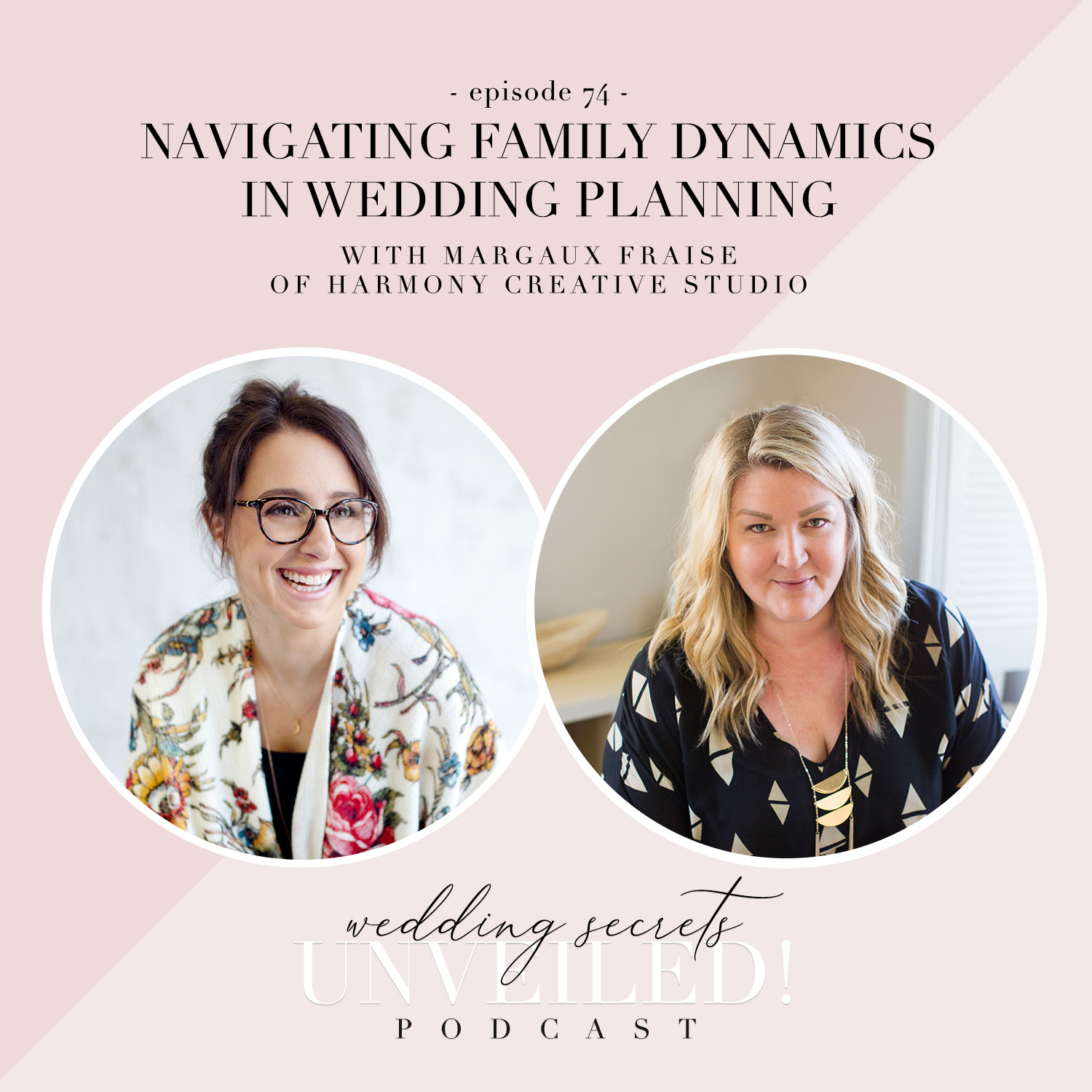
Meet Margaux.
I’m Margaux Fraise and I’m a wedding planner based in Los Angeles, California. I own Harmony Creative Studio. We’re a boutique wedding planning firm, so we serve 8-10 couples per year. I’ve been doing this for 12 years now and have helped plan over 180 weddings. So, we’ve seen a lot of weddings, couples, families and lots of family dynamics. Family dynamics can be a controversial topic – at least it’s become that way in the last few years. Weddings make families do wacky things – I’ve seen perfectly lovely people do some very interesting things… So, I look forward to getting into this topic!
I love this topic. Everybody has a family and it’s a topic for everyone! So, tell me about some common challenges that you see when it comes to family dynamics and the wedding couples?
There’s two major challenges that come up. For our age group, dealing with boomer parents – divorce is a common challenge that comes up. From where to seat people to how to pose them in photos, it can be hard. Some parents are better than others at keeping their you-know-what together during a wedding. The second dynamic that comes up a lot is fairness between families. Ultimately, that’s a lose-lose situation and only benefits one family in the end. Usually one family feels left out and that is kind of the case even before the wedding.
If you’re listening or reading this, the bottom line is that weddings don’t create new problems. They’re a vessel to highlight existing problems. People think that planning a wedding is stressful because of these problems starting – but it’s not new. It’s just a microscope on the existing issues.
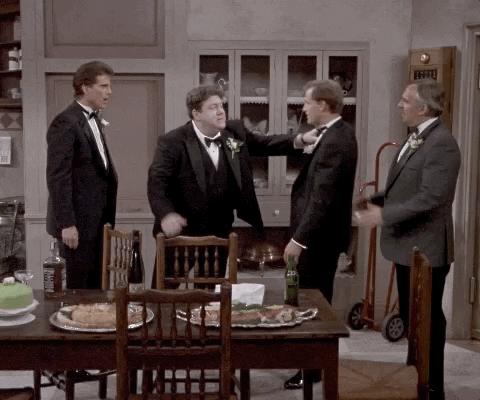
You nailed it! Weddings just show what was already there going on. How do you talk to couples who are worried about having conversations about conflict with their families?
As a wedding planner, I’ve definitely seen a lot of this stuff. So first, planning with couples – I never assume I know anything about someone’s family. So I always approach these questions initially in the process – not in the middle. I provide a list of conversations people may want to have with their families about these dynamics – in the order that they need to happen. You’re going to talk about the finances, the guest list, the roles, and so much more. I see the biggest issues when people try to skip over these steps. Instead, have a very purposeful conversation with yourselves and your families about what you want out of your wedding day.
When do a lot of the family dynamics come into play?
When you start to talk about the guest list, things really can get heated. People always want to start with the guest list but often don’t know who to invite so they go to their parents and next thing you know, you’ve got the neighbor you haven’t seen in 20 years on the “must invite list”. Parents often have different ideas about who’s going to be involved in what they consider to be a special day for themselves. We actually have a guest list dynamics sheet that we share with our couples to talk about friends, godparents, work friends, and family adjacent guests. You need to have a strategy and a plan going in.
First of all, before you build a guest list – have conversations about your budget and event expectations. Do you want a small intimate wedding or a blowout with 500 people? Then you can turn to your family and share those visions. Have the talk that you want 100 people, you’ve got 70 from your list and have 30 seats left for them. I recommend having an open ended conversation about it, though – ask who they’d want to invite and why. Not say you have a specific number of seats left. This helps you get the lay of the land. It helps you avoid making anyone feel like they got stuck in a box or feeling like they’re getting “less than” someone else. By coming at the conversations from this approach, you’re keeping your loved ones from getting defensive. I also always suggest a tiered guest list system.
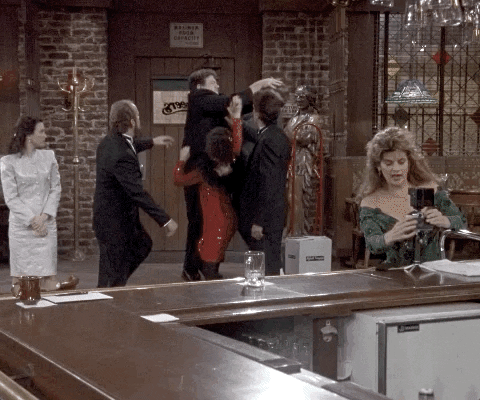
What’s a tiered guest list system?
Think of your guest list in tiers. Who are the essential core people that you’d be heartbroken if they didn’t show up? That’s your first tier. Then you’ll go to the next – important family.That tier is different for everyone – it could be grandparents, a specific aunt, or cousin, or friend. Then you go to the next tier, which is your extended family or other friends. Those are the ones you fit in if you have room. So, you basically have a 1-2-3 tiered system of invites. And this goes on both sides. Most couples will wind up with most of their guests in the first two tiers – immediate family and extended family. We sometimes see an issue if one family is larger than the others at this stage, too.
What happens when one family is “monopolizing” the guest list?
I can share about this one from my own personal wedding day! My family is very small and my husband’s is very large. My parents are still married and my grandparents on both sides are sadly already deceased. Finally, my aunts and uncles I’m not super close with but I allowed my parents to invite them. That’s six whole people. My husband’s parents are divorced. His father is remarried, his mother’s not. They have his father has nine brothers and sisters, his mother has six brothers and sisters. He also considers his cousins to be siblings and is close to his aunts and uncles. So, we had to come to this agreement about the kind of wedding we wanted. We had to have conversations because his parents assumed they’d all be involved. But we had to decide who really fell in our first two tiers.
So, we went into the conversation with our own parents saying we wanted an intimate wedding day and here’s who we plan to invite. Then we asked for their feedback. His dad wanted to invite a few more people and we had to have the budget conversation – that we’d budgeted for a set amount and that would add 25 people. Because my father-in-law is a reasonable man, he helped cover the difference. But that’s not always the case. Again, this is the conversation that we had early on – not deep into planning.
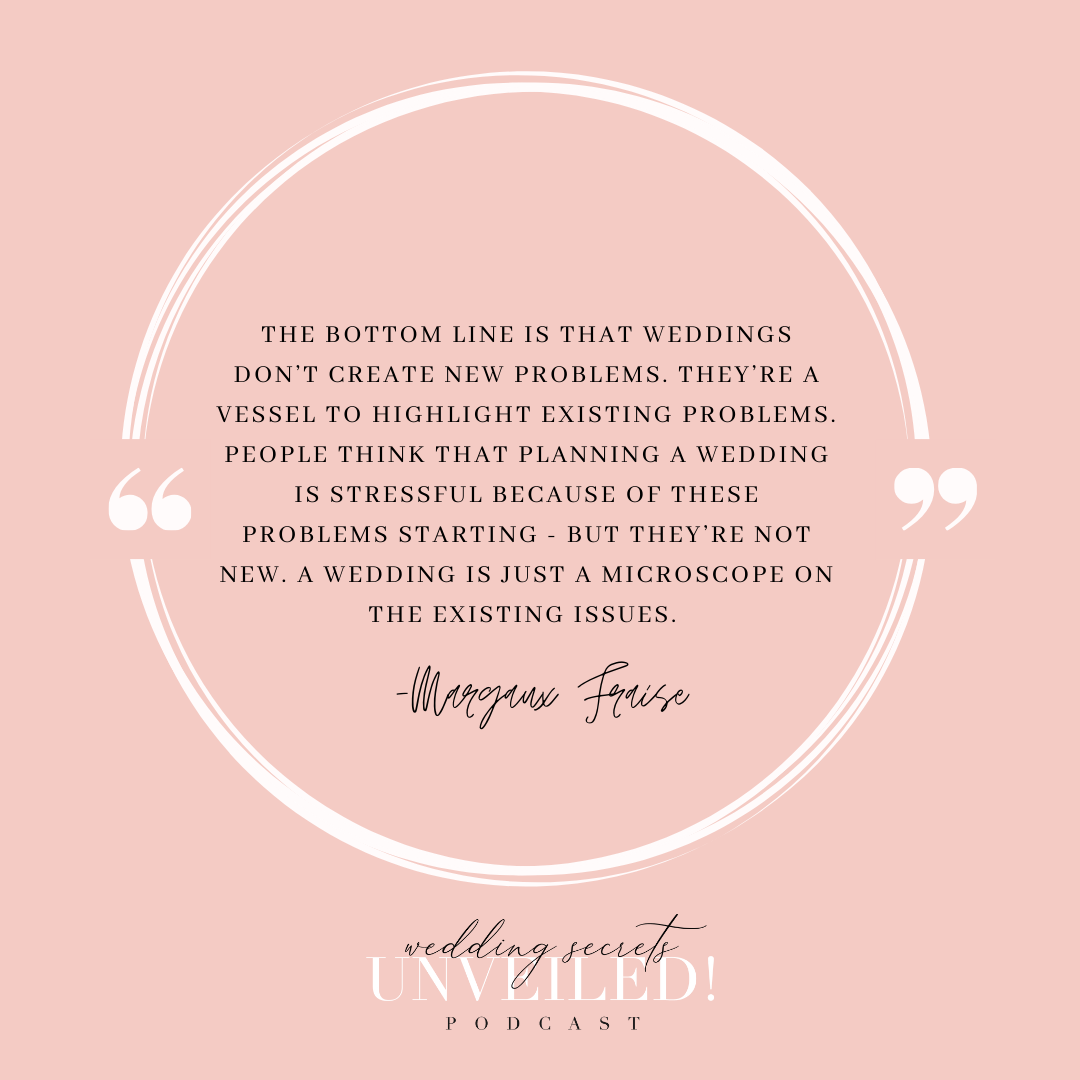
Can you share an example of how you helped a couple with these family dynamics?
I did a wedding early on in my career that brought my attention to family dynamics. It was a wedding in Los Angeles that was blending a few different cultures. The bride was Lebanese and the groom’s family was not, but they were very large. In the planning process ,the bride heard her father wanted to invite many people she didn’t know and we discussed how to talk about that. She acknowledged that she wouldn’t be able to have the wedding she envisioned without his financial help, so there was some give and take there about how to address the guest additions. Together, we discussed that you or your parents may not get 100% of what you want on your wedding day because of those dynamics. I asked her if it was worth having those couple of extra people in order to get the things she wanted so badly – the raw bar, the flowers, etc. And she said it was worth it. So that was that.
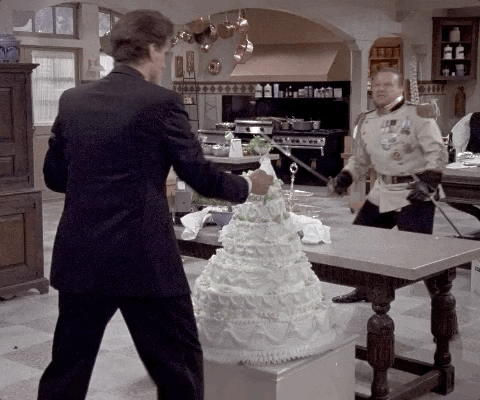
So, when I help other couples there’s a few things we focus on. First, is it important to have an argument? Or is it something that you are okay with to get the end result that you want? Sometimes the answer is to have the argument – and sometimes, it’s not. Sometimes couples come back to me and say that they decided to pay for an event themselves because we don’t want to deal with the dynamics. One of my couples actually pushed back their wedding day a whole year because they decided to fund it themselves to avoid further straining a relationship and being able to make all of the decisions themselves. You have to shift your perspective. Controversial situations don’t have to be controversial. Decide what matters to you.
Can you talk to us about dealing with potential religious differences for a wedding day?
I think I’m in a good position to talk about this because LA is a big cultural melting pot. At least 50 of my weddings have had couples with very different cultural or religious backgrounds. One of my weddings was a bride of Chinese descent marrying a Caucasian man. Chinese wedding ceremonies have components – like a tea ceremony. So, this couple had to decide if they wanted to have the tea ceremony as part of their celebration or a separate date. I personally think that there’s no wrong way to incorporate ceremony components (religious or cultural) that matter to you! So, they decided they wanted to have their tea ceremony as part of their main celebration – not another separate day. Once they came to that conclusion, they were able to approach her parents and express that they wanted to do it that day and why. The parents were thrilled.
It was interesting because the couple had all this fear and nerves about that conversation. They had an expectation that her parents would react a certain way – but they didn’t.
Now, that’s a great piece of advice. What about children? I’m sure that’s another dynamic that comes up regards to the families and their dynamics and the guestlist.
Yeah, I always tell people, it’s up to you to decide if you’re having children at your wedding. Again, the couple needs to decide first because I believe that they deserve to have the wedding they want. Then you go into those conversations with your family. I think it’s important to consider how many children that might come when making this decision. Decide if it’s worth having them there. Maybe you should hire a babysitter or something to help pave the road of good intention. But, if you also know that you don’t want children at all – then that’s okay, too.
I think a lot of people come into the children conversation with this “thi is what we’ve decided for our event, and you can take it or leave it”. While that seems like a perfectly reasonable stance for you to have, it’s not being seen as perfectly reasonable by people who have small children.

That’s great advice. A little conversation can go a long way.
Yeah, I had a couple who decided not to have kids at their event. They were very concerned about how people were going to take it. So, I asked how many children they were talking about. It turned out to be two families so I suggested a personal call to them. Have that human moment. The phone calls went a long way with those parents being okay and understanding the situation. Now, that may not be possible with 30 families – but it just depends on the scope of the situation.
Well, we talked a little bit about religion. We talked a little bit about children. What about when you’re dealing with some families and dynamics when people have a falling out?
My biggest advice is to know your people. That’s an overall piece of advice or all of these dynamics. You know if Uncle Bob can hold it together for one event or not. If the answer is no, then maybe they don’t get an invite. I’m not saying that you don’t love Uncle Bob, I’m just saying that if you know in your heart of hearts that this person cannot be counted on to be a mature adult for one day, and hold back their issues, advice, actions, or whatever… then you have to be honest with yourself.
So ask yourself: Do I really want this person at my wedding? Will I be very sad 10 years from now that they were not involved? And if the answer is truly yes, then you should invite them and roll the dice. But on the other hand, if you think that this person that you’re worried about might be an issue, talk with the family who would want them there. Maybe your mom or dad. If they’re fine with the non- invite, leave it alone. If not, then you need to have a deeper conversation.
What do you recommend if someone thinks they’re going to be invited to the wedding and isn’t actually going to be?
So I think that sometimes just goes hand in hand with the conversation about children in the sense that my biggest advice about this is to not lie about why you’re not inviting that person. Families talk. So, whoever was not invited will find out. Same thing with kids. Don’t lie and say the venue doesn’t allow them. That will be found out and cause a bigger problem down the line. It can be a hard truth but it’s better to talk about it outright.
It’s always a lot easier to have a conversation that involves the real reason – maybe that you’re keeping it small or have a lot of relatives on the other side to balance out, or whatever it is. I also always say that if someone really feels like they should be involved, make plans to celebrate with that person. It’s a nice way to avoid anyone feeling left out.
Wrap-Up Question
What final three pieces of advice would you have with someone struggling with their family and in-laws during the wedding planning journey?
My number one tip is always communication. Without communicating, you’re assuming a lot and filling in the gaps with anxiety.
You have to talk to your partner and come into the conversation about your event as a united front. Determine what you want, what you want the event vibe to be, and have all of those conversations.
The third thing is to know your people. Be honest about who they are and how they’ll behave during your event. Your people are not going to change because it’s a wedding day and is important to you. That’s not how humans behave.
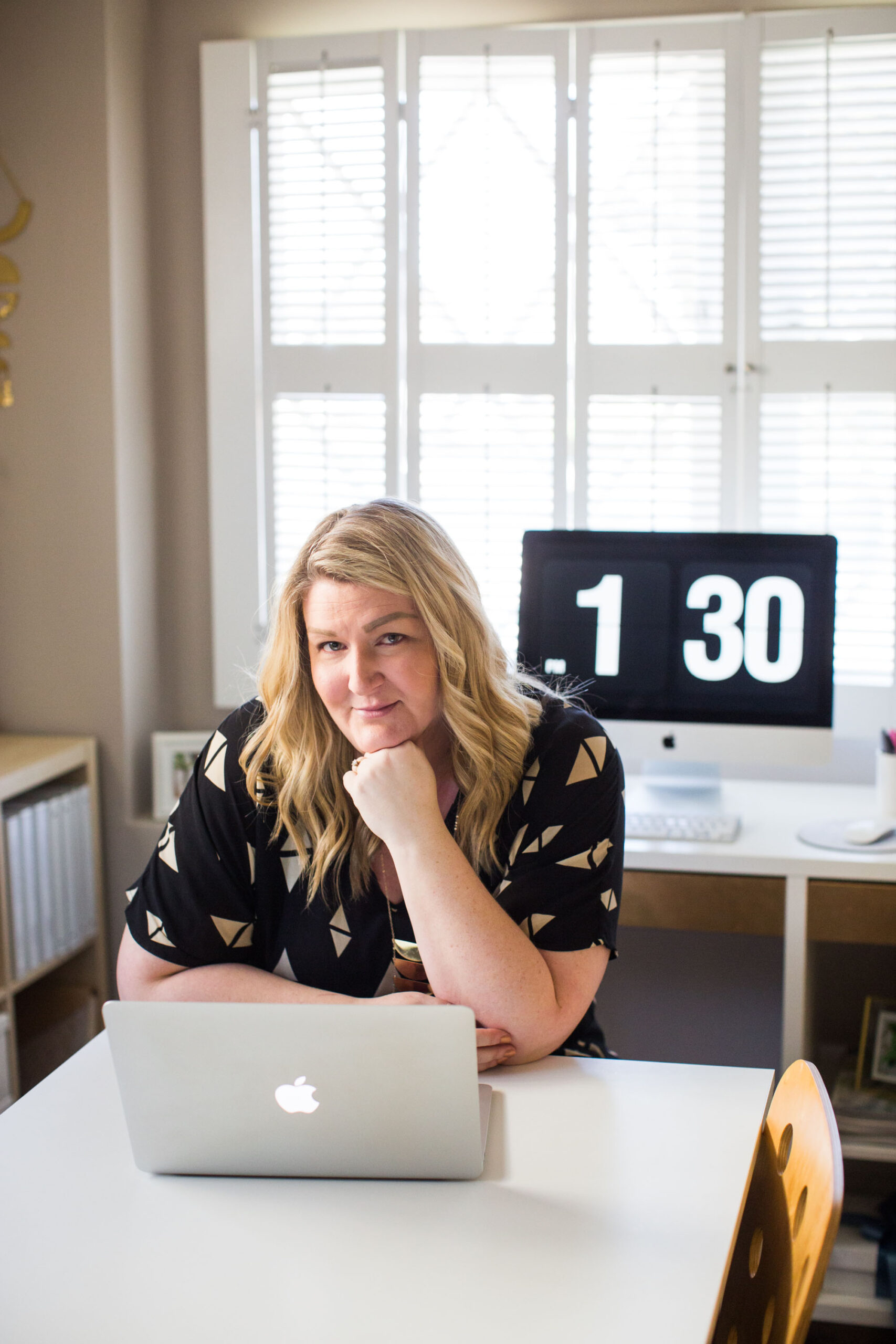
What We Discussed
Meet Margaux (2:26)
Common family dynamics in wedding planning (2:46)
Guest lists and family dynamics (12:47)
Navigating cultural and religious differences (28:45)
Honesty during wedding planning (39:01)
Wrap-Up Question (45:24)
Links Mentioned in the Episode
Find Harmony Creative Studio at Website | Instagram | Facebook | Pinterest
You can subscribe to this podcast from wherever you’re listening so you never miss an episode. And, we would so appreciate it if you left a fabulous review for our show on Apple podcast! Even better, share it with a friend. It’s a great way to show your support and let us know what you think. Thank you so much for listening!